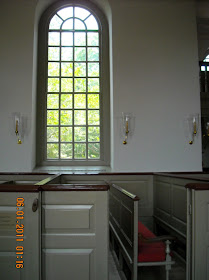 |
| One of the oldest Episcopal Churches in America. |
 |
| This historic building has been in service to God and Man continuously since 1715. |
 |
| We notice the pews were boxed in. Joe thought maybe, each box of seats were for families. |
 |
| Another view of the walled pews. |
 |
| Notice the one sided supported roof over the podium. |
 |
| Outside the church is a tomb of a Reverend's wife who died giving birth to her daughter. |
 |
| Entrance from the side street to the church. |
 |
| Across the street from the Episcopal church, is the Colonial Garden. |
 |
| I took pictures of how they used nature to stake up their tomatoes. |
 |
| Not sure what they are growing here, but I like the fence they made from sticks. |
 |
| Thin branches were used here for beans. |
 |
| Hope these pictures help some gardeners out this summer. I know I will be referring back to this blog, when I have a permanent home and have a garden again. |
 |
| A very large rain barrel. |
 |
| I had seen these glass bells in some of the stores. I told Joe I thought they may be use to cover young plants. I was right! |
 |
| The Governor's Palace and Gardens from the main street. |
 |
| This is another building you get to go in with a pass. |
 |
| This is the one Joe and I would have liked to see inside. Maybe another day. |
 |
| The Palace was built in 1705-1720. it burned to the ground in 1781. |
The Palace was rebuilt in 1930 on the foundations of the original building and accurate restoration was made possible by a drawing of Thomas Jefferson, an engraving of the front, and other surviving records and artifacts.





No comments:
Post a Comment